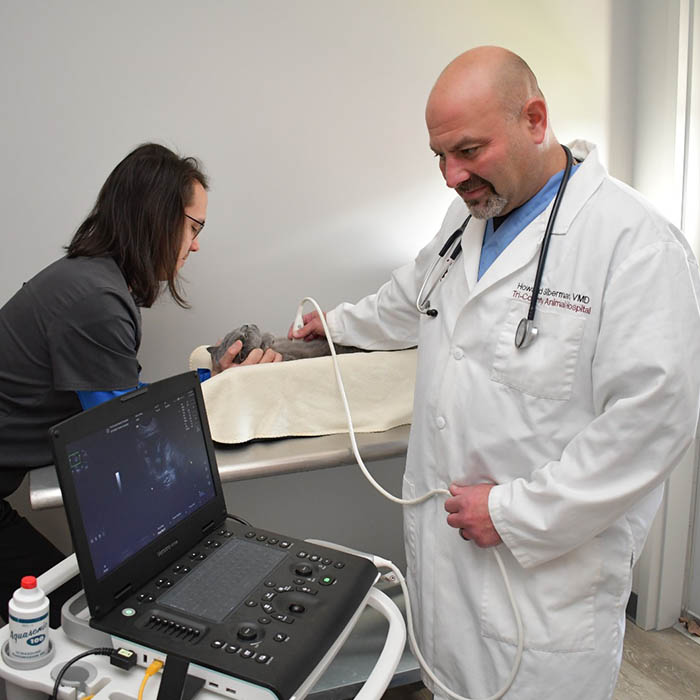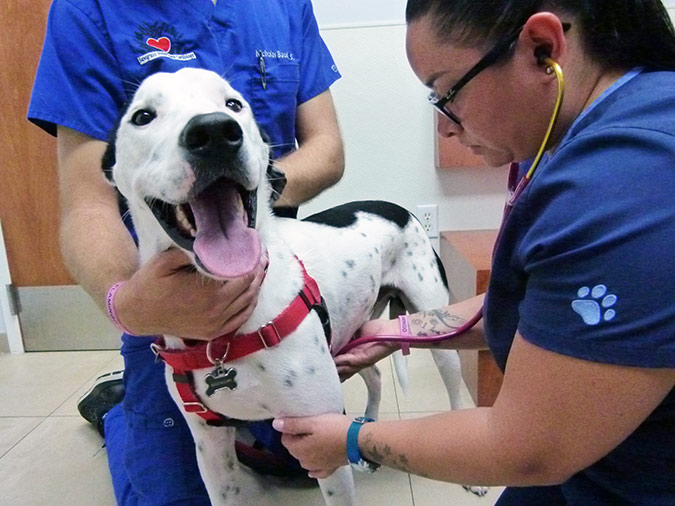The Role of a Board Certified Veterinary Cardiologist in Pet Emergency Care}
Exploring the Important Services Provided by a Vet Cardiologist: Recognizing Ultrasound and CT Check Methods
Vet cardiologists play a vital role in the wellness of pet dogs by detecting and treating different heart problems. They use innovative imaging techniques, such as heart ultrasound and CT scans, to provide precise assessments. Each method has its unique benefits and applications. Comprehending these strategies is crucial for pet owners looking for the very best take care of their buddies. What variables should animal proprietors take into consideration when choosing in between these analysis devices?

The Duty of Vet Cardiologists in Pet Dog Health Care
Veterinary cardiologists play an important function in the medical care of pet dogs, focusing particularly on diagnosing and dealing with heart-related conditions. They possess specialized training that permits them to interpret complex diagnostic tests and identify various cardio concerns. These specialists make use of advanced methods, such as echocardiography and electrocardiography, to assess heart feature and framework accurately.Veterinary cardiologists additionally develop customized treatment plans that may consist of medicines, way of life adjustments, and, in many cases, medical treatments. Their knowledge includes educating animal proprietors regarding heart health, stressing the relevance of routine exams and early discovery of prospective troubles. Partnership with basic vets is important, as it guarantees thorough treatment for pet dogs with presumed cardiac concerns. By using specialized services, vet cardiologists considerably enhance the quality of life for family pets and offer satisfaction for their proprietors, reinforcing the importance of heart wellness in overall family pet wellness.
Typical Cardiac Concerns in Animals
Usual heart issues in family pets can significantly influence their health and wellness and lifestyle. Heart whisperings, different kinds of cardiomyopathy, and congenital heart issues are among one of the most prevalent problems that vets experience. Board Certified Veterinary Cardiologist. Understanding these problems is important for pet dog owners to ensure prompt diagnosis and proper treatment
Heart Murmurs in Pets
Although heart murmurs can be a source of worry for pet owners, they are not constantly a measure of serious health and wellness concerns. A heart murmur is an irregular audio produced by rough blood circulation within the heart. In pets, these murmurs can be created by different variables, including congenital heart issues, shutoff concerns, or even anxiety throughout exams. Many animals with heart murmurs lead typical lives without considerable wellness impacts. To identify the underlying cause, veterinary cardiologists typically utilize analysis strategies such as echocardiograms and Doppler ultrasounds. Early detection and evaluation are crucial, as they may assist manage any type of prospective heart problems effectively. Pet owners are encouraged to consult their veterinarian for a comprehensive analysis if a heart whispering is spotted.
Cardiomyopathy Types Explained
Cardiomyopathy incorporates a team of conditions influencing the heart muscular tissue, leading to compromised cardiac feature in pet dogs. One of the most usual types include expanded cardiomyopathy (DCM), hypertrophic cardiomyopathy (HCM), and limiting cardiomyopathy (RCM) DCM mostly impacts canines, causing the heart to enlarge and damage, which reduces its capacity to pump blood effectively. In comparison, HCM is extra common in cats, characterized by the thickening of the heart walls, frequently leading to obstructed blood flow. RCM, though less common, occurs when the heart muscle comes to be stiff, limiting its capacity to fill up with blood. Each kind presents one-of-a-kind difficulties in diagnosis and therapy, necessitating specialized vet cardiological examination to assure peak management and look after influenced pet dogs.
Hereditary Heart Flaws
Hereditary heart flaws stand for a significant classification of heart issues in family pets, distinct from gotten conditions such as cardiomyopathy - Cancer Veterinary Near Me. These flaws are architectural abnormalities existing at birth, affecting the heart's typical feature. Typical types consist of license ductus arteriosus, ventricular septal issues, and pulmonic stenosis. Signs and symptoms may differ widely, varying from moderate to severe, and can include workout intolerance, coughing, and difficulty breathing. Early diagnosis through innovative imaging methods like ultrasound is essential for reliable administration. Vet cardiologists play an important function in determining these conditions and recommending ideal treatment choices, which might consist of clinical management or medical treatment. Recognizing genetic heart issues permits better end results and enhanced lifestyle for influenced family pets
Understanding Cardiac Ultrasound: Exactly How It Works
A substantial variety of veterinary methods now utilize heart ultrasound as a vital analysis tool for reviewing heart wellness in pets. This non-invasive technique makes use of high-frequency audio waves to produce images of the heart's framework and feature. Throughout the treatment, a veterinary service technician applies a gel to the pet's upper body and makes use of a transducer to emit ultrasound waves. These waves bounce off the heart and surrounding frameworks, creating real-time images on a monitor.Veterinarians can assess various facets of cardiac health, consisting of chamber dimension, wall surface movement, and valve function. In addition, heart ultrasound permits the discovery of problems such as liquid build-up and congenital heart defects. This strategy is essential for diagnosing conditions that might not show up via common radiographs. By supplying comprehensive info regarding the heart's anatomy and performance, heart ultrasound help in formulating reliable treatment plans for animals dealing with heart condition.
The Relevance of CT Checks in Detecting Heart Issues
Exactly how do CT scans enhance the medical diagnosis of heart disease in veterinary medication? CT scans give comprehensive cross-sectional photos of the heart and surrounding structures, enabling veterinarians to picture complicated anatomical partnerships. This imaging method is particularly helpful in determining congenital heart flaws, cardiac lumps, and abnormalities in capillary. By utilizing innovative imaging formulas, CT scans can analyze heart chamber dimensions and feature, providing a comprehensive sight that might be challenging to attain with conventional methods.Additionally, CT angiography can visualize blood circulation and determine areas of constriction or obstruction, which is crucial for preparing potential treatments. The speed and accuracy of CT more info here scans likewise assist in fast medical diagnoses, essential in emergency circumstances. Eventually, the unification of CT scans into vet cardiology significantly enhances the accuracy of medical diagnoses, making it possible for targeted therapy plans and enhancing individual end results for animals experiencing heart problems.
Comparing Ultrasound and CT Scan Strategies
While both ultrasound and CT scans are invaluable tools in veterinary cardiology, they offer unique benefits and constraints that influence their use in identifying heart conditions. Ultrasound, or echocardiography, supplies real-time imaging of the heart's framework and feature, allowing vets to assess heart chambers, shutoffs, and blood flow. It is particularly efficient for assessing conditions like congestive heart failing and cardiomyopathy. Ultrasound might be limited in picturing particular physiological structures due to patient size or obesity.In contrast, CT scans offer comprehensive cross-sectional pictures of the heart and bordering cells, making them excellent for determining architectural problems, lumps, or vascular concerns. Although CT scans give detailed understandings, they need sedation and check these guys out may include radiation exposure. Inevitably, the option between ultrasound and CT scans relies on the details scientific situation, the client's condition, and the details needed for an accurate diagnosis.
Treatment Options Offered Through Vet Cardiology
Vet cardiology provides a series of treatment options customized to attend to different heart conditions in pets. Treatment strategies frequently start with way of life modifications, consisting of diet plan changes and exercise adjustments, focused on improving total heart health. Medicines play an important duty, with cardiologists prescribing drugs such as diuretics, beta-blockers, and ACE inhibitors to manage signs and symptoms and enhance heart function.In more severe cases, interventional procedures, such as balloon valvuloplasty or stent positioning, might be necessary to ease blockages or enhance blood circulation. For sure genetic heart flaws, surgical options may be discovered to deal with structural concerns. In addition, ongoing monitoring and follow-up treatment are essential parts of a detailed therapy plan, enabling prompt changes based on the animal's reaction to therapy. On the whole, veterinary cardiology focuses on offering reliable, customized care to enhance the health and wellness and well-being of pet individuals with heart disease.
Just how to Prepare Your Animal for a Cardiac Assessment
Preparing a pet for a cardiac analysis is necessary to ensure accurate outcomes and a smooth procedure. Proprietors need to initially set up the visit with the veterinary cardiologist and go over any details demands or problems. It is a good idea to keep food for at least 12 hours prior to the assessment, as this assists improve imaging high quality throughout procedures like ultrasound or CT scans.Additionally, preserving a tranquil setting on the day of the consultation can aid lower the family pet's anxiousness. It is advantageous to bring along any type of relevant medical documents, including previous examinations and drugs (Board Certified Veterinary Cardiologist). Owners should additionally ensure that their pet dog is comfy and leashed during transport to the facility. Familiarizing themselves with the analysis procedure can reduce fears and help in asking informed questions throughout the consultation. By adhering to these actions, owners can add considerably to the performance of the heart evaluation
Often Asked Questions
How much time Does a Heart Ultrasound or CT Scan Take?
The period of a heart ultrasound commonly ranges from 30 to 60 minutes, while a CT check may take roughly 15 to 30 minutes. Variables such as the individual's condition websites can affect these time price quotes.

Exist Any Risks Connected With These Analysis Procedures?

Can I Remain With My Animal During the Treatment?
The veterinary facility's policy generally dictates whether pet dog proprietors can continue to be throughout treatments. While some facilities urge proprietor visibility for comfort, others may require separation to assure safety and security and ideal problems for analysis imaging.
Just how Much Do These Analysis Examinations Normally Expense?
The prices of diagnostic tests, such as ultrasound and CT scans, generally vary based on location and facility. Commonly, rates range from a few hundred to over a thousand dollars, mirroring the intricacy and modern technology entailed.
What Is the Recovery Refine After a Cardiac Analysis?
The recuperation procedure after a cardiac analysis includes keeping track of the animal for any type of prompt reactions, making certain comfort, and restricting physical task. Vets normally offer post-evaluation instructions to lead animal owners throughout this necessary recuperation period. Heart murmurs, numerous kinds of cardiomyopathy, and genetic heart problems are amongst the most prevalent problems that vets encounter. A heart murmur is an uncommon sound created by turbulent blood circulation within the heart. Cardiomyopathy includes a group of conditions impacting the heart muscle, leading to compromised cardiac function in pets. Genetic heart flaws stand for a considerable group of cardiac problems in pets, distinctive from obtained conditions such as cardiomyopathy. Ultrasound, or echocardiography, offers real-time imaging of the heart's framework and feature, permitting vets to assess heart chambers, shutoffs, and blood circulation.